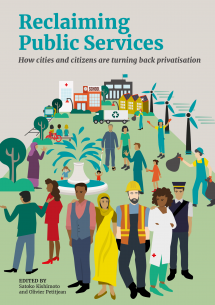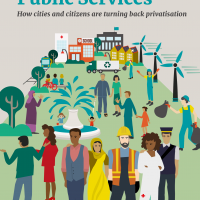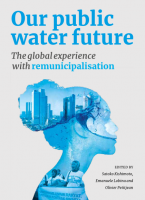Reclaiming Public Services How cities and citizens are turning back privatisation
Reclaiming Public Services is vital reading for anyone interested in the future of local, democratic services like energy, water and health care. This is an in-depth world tour of new initiatives in public ownership and the variety of approaches to deprivatisation.

Downloads
-
[Summary in French] Remunicipalisation: comment villes et citoyens écrivent l'avenir des services publics (PDF, 1.66 MB)Average time to read: 45 minutes
-
[Summary in English] (PDF, 1.53 MB)Average time to read: 20 minutes
-
[Summary in Japanese] 再公営化という選択:世界の民営化の失敗から学ぶ (PDF, 2.11 MB)Average time to read: 45 minutes
-
[Summary in Swedish] Ta tillbaka offentliga tjänster: hur städer och medborgare vänder på privatiseringar (PDF, 1.68 MB)Average time to read: 45 minutes
-
[Summary in Catalan] Remunicipalitzacions Com ciutats i ciutadania estan escrivint el futur dels serveis públics (PDF, 1.64 MB)Average time to read: 45 minutes
-
[Summary in Korean] 공공서비스 되찾기 세계의 도시와 시민은 민영화를 어떻게 되돌리고 있는가 (PDF, 1.75 MB)Average time to read: 45 minutes
-
[Summary in Greek] Για να ανακτήσουμε τις δημόσιες υπηρεσίες (PDF, 2.14 MB)Average time to read: 45 minutes
-
(Edition in Italian) Il ritorno alla gestione pubblica dei servizi di base (PDF, 2.52 MB)Average time to read: 6 hour minutes
-
استرداد الخدمات العامة: المدن والمواطنين يرفضون الخصخصة (PDF, 1.37 MB)Average time to read: 45 minutes minutes
Authors
From New Delhi to Barcelona, from Argentina to Germany, thousands of politicians, public officials, workers, unions and social movements are reclaiming or creating public services to address people’s basic needs and respond to environmental challenges.
They do this most often at the local level. Our research shows that there have been at least 835 examples of (re)municipalisation of public services worldwide since 2000, involving more than 1,600 municipalities in 45 countries.
Why are people around the world reclaiming essential services from private operators and bringing their delivery back into the public sphere? There are many motivations behind (re)municipalisation initiatives: a goal to end private sector abuse or labour violations; a desire to regain control over the local economy and resources; a wish to provide people with affordable services; or an intention to implement ambitious climate strategies.
Remunicipalisation is taking place in small towns and in capital cities, following different models of public ownership and with various levels of involvement by citizens and workers. Out of this diversity a coherent picture is nevertheless emerging: it is possible to build efficient, democratic and affordable public services. Ever declining service quality and ever increasing prices are not inevitable. More and more people and cities are closing the chapter on privatisation, and putting essential services back into public hands.
Messages from Vienna, Barcelona and Paris
Ulli Sima, Vienna City Councilor for the Environment and Wiener Stadtwerke: “As early as 2001, Vienna protected drinking water with a constitutional decision. Municipal services must remain public and should not be sacrificed to private profit. We want to ally with other cities for strong municipal servicest."
Eloi Badia, the Barcelona Councilor for presidency, water and energy: “It is important to demystify the process of privatisation that has been launched in recent years by several governments, because it's a model that has not proved its efficiency, failing to offer a better service or a better price.”
Célia Blauel, President of Eau de Paris and Deputy Mayor of Paris in charge of the environment, sustainable development, water and the energy-climate plan: “Bringing local public services under public control is a major democratic issue, especially for such essential services as energy or water. It means greater transparency and better citizen supervision. In the context of climate change, it can contribute to leading our cities toward energy efficiency, the development of renewables, the conservation of our natural resources, and the right to water. ”
Key findings of the book
- There are better solutions than privatisation
- Remunicipalisation is far more common than presumed, and it works
- Remunicipalisation is a local response to austerity
- Remunicipalisation is a key strategy for energy transition and energy democracy
- Bringing services back in-house is ultimately cheaper for local authorities
- Remunicipalisation drives better, more democratic public services
- Remunicipalisation presents 835 more reasons to fight trade and investment deals
- Lessons learned: Don’t privatise in the first place
- Remunicipalisation provides opportunities for new, diversified, democratic public ownership
- Remunicipalising cities and citizens groups are working together and building networks
Table of contents
- Introduction The untold story [PDF] Satoko Kishimoto and Olivier Petitjean
- Chapter 1 Remunicipalisation in France: From addressing corporate abuse to reinventing democratic, sustainable local public services [PDF] Olivier Petitjean
- Chapter 2 Why renationalise? Contemporary motivations in Latin America [PDF] M’Lisa Colbert
- Chapter 3 The 835 reasons not to sign trade and investment agreements [PDF] Lavinia Steinfort
- Chapter 4 Norwegian municipalities bringing social services back into public hands [PDF] Bjørn Pettersen and Nina Monsen
- Chapter 5 Remunicipalisation in Germany and Austria: What does it mean for employees? [PDF] Laurentius Terzic
- Chapter 6 Against the grain: New pathways for essential services in India [PDF] Benny Kuruvilla
- Chapter 7 Unpacking the dangerous illusion of PPPs [PDF] María José Romero and Mathieu Vervynckt
- Chapter 8 Our City, Our Grid: The energy remunicipalisation trend in Germany [PDF] Sören Becker
- Chapter 9 Public ownership is back on the agenda in the UK [PDF] David Hall and Cat Hobbs
- Chapter 10 A citizen wave to reclaim public and democratic water in Catalan municipalities [PDF] Míriam Planas
- Conclusion Cities and citizens are writing the future of public services [PDF] Olivier Petitjean and Satoko Kishimoto
The book is published by Transnational Institute (TNI), Multinationals Observatory, Austrian Federal Chamber of Labour (AK), European Federation of Public Service Unions (EPSU), Ingeniería Sin Fronteras Cataluña (ISF), Public Services International (PSI), Public Services International Research Unit (PSIRU), We Own It, Norwegian Union for Municipal and General Employees (Fagforbundet), Municipal Services Project (MSP) and Canadian Union of Public Employees (CUPE).







